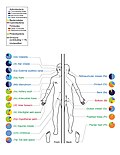Human microbiome: Difference between revisions
CSV import Tags: mobile edit mobile web edit |
CSV import |
||
| Line 34: | Line 34: | ||
[[Category:Health]] | [[Category:Health]] | ||
{{stub}} | {{stub}} | ||
== Human microbiome == | |||
<gallery> | |||
File:Skin Microbiome20169-300.jpg|Skin Microbiome | |||
File:Microbiome analysis flowchart.png|Microbiome Analysis Flowchart | |||
File:Commensals vs pathogens mechanism.png|Commensals vs Pathogens Mechanism | |||
File:Constituents and mechanisms of microbiome-based interventions.webp|Constituents and Mechanisms of Microbiome-based Interventions | |||
</gallery> | |||
Latest revision as of 01:28, 20 February 2025
Human Microbiome
The Human Microbiome refers to the collection of microbes or microorganisms that inhabit the human body, creating a sort of "mini-ecosystem". Our microbiome, which is primarily bacterial, plays a vital role in our health by helping control digestion and benefiting our immune system and many other aspects of health. An imbalance of unhealthy and healthy microbes, which can be influenced by diet and disease, can contribute to weight gain, skin conditions, autoimmune disorders, and various other diseases.
Overview[edit]
The human microbiome is the subject of much current research, and new discoveries are constantly being made. The microbiome is not only unique to each individual, but can also change over time, influenced by factors such as diet, environment, and disease. The largest populations of microbes reside in our gut, particularly in the large intestine (the gut microbiota), but they can be found throughout the body, including the skin, mouth, nose, and urogenital tract.
Role in Health[edit]
The microbiome plays a crucial role in our health. It helps control digestion by breaking down food and helping the body absorb nutrients. It also plays a role in the immune system, helping to fight off harmful bacteria and viruses. In addition, the microbiome can influence our mood and mental health, with research suggesting a link between the gut microbiota and conditions such as depression and anxiety.
Role in Disease[edit]
An imbalance in the microbiome, known as dysbiosis, can contribute to a range of health problems. These include obesity, diabetes, heart disease, inflammatory bowel disease, autoimmune disorders, and even certain types of cancer. Research is ongoing to better understand the link between the microbiome and disease, and to develop new treatments that target the microbiome.
See Also[edit]
References[edit]
<references />






